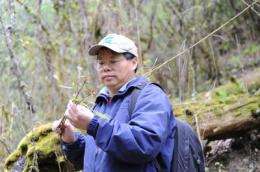MSU leads global effort to study link between people, planet

Hundreds of scientists from around the world are involved in a new initiative at Michigan State University to improve cutting-edge research on the increasingly fragile relationship between humans and the environment.
The National Science Foundation recognized this research as a priority and has selected MSU to lead the effort, called the International Network of Research on Coupled Human and Natural Systems, or CHANS-Net. The NSF is supporting the project with a $1.5 million, five-year grant.
MSU's role includes building a global database of scholars and their projects, fostering collaboration, helping identify and train new talent and raising awareness. In mid-April, MSU will lead a group of scientists to Washington, D.C., to present key research findings at an NSF symposium and at the annual meeting of the Association of American Geographers.
In the past three years MSU scientists have received about $6 million in NSF funding for coupled human and natural systems research - far more than any other university. The research focuses on everything from panda habitat in China to development along Nicaragua's Mosquito Coast.
Thomas Baerwald, a program director with NSF, said Michigan State has done an excellent job encouraging researchers to bridge the natural and social sciences in an effort to focus on groundbreaking sustainability research.
"It's a testament to the university's success in fostering interdisciplinary collaborations that advance basic understanding and address significant environmental problems," Baerwald said.
Jianguo "Jack" Liu, MSU Distinguished Professor and world-renowned ecologist, is directing CHANS-Net. He said the project reflects one of MSU's primary missions: to solve real-world problems though applied research, global engagement and collaboration among the scientific disciplines.
"This is really an exciting frontier in terms of research," Liu said. "We want to help people understand the value of ecosystems to human society, rather than just for the sake of protecting the environment. A lot of people treat the environment as something that humans can use forever, when in reality that's not true."
The key is bringing researchers together and combining their strengths - getting the economists working with the hydrologists, for example, to develop irrigation systems that are both efficient and fair to farmers.
It's also imperative, Liu noted, to attack the problem from an international perspective. The growing list of more than 300 scientists involved in CHANS-Net work at institutions in the United States, Africa, China, India, United Kingdom and elsewhere around the world.
At MSU, scholars receiving grants for CHANS-related research come from a host of colleges, including Agriculture and Natural Resources, Communication Arts and Sciences, Education, James Madison, Lyman Briggs, Natural Science and Social Science.
MSU has also shown its commitment by recently hiring three faculty members specifically to conduct CHANS research.
Provided by Michigan State University
















